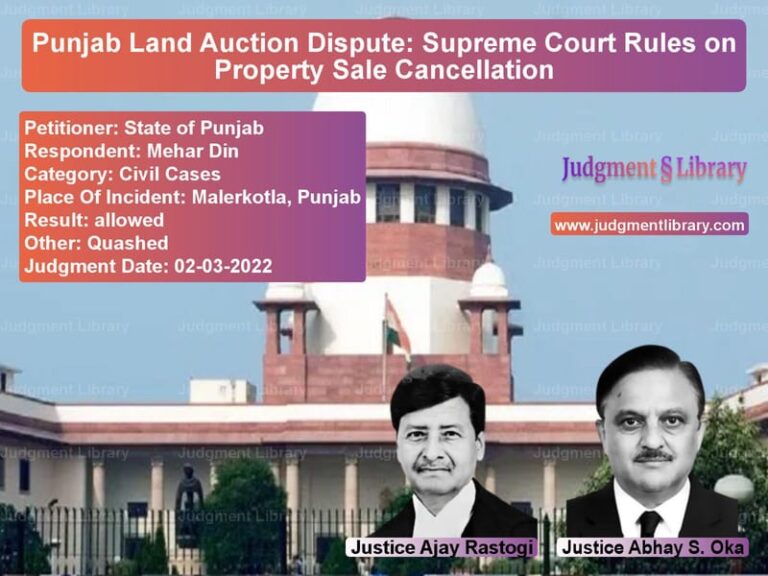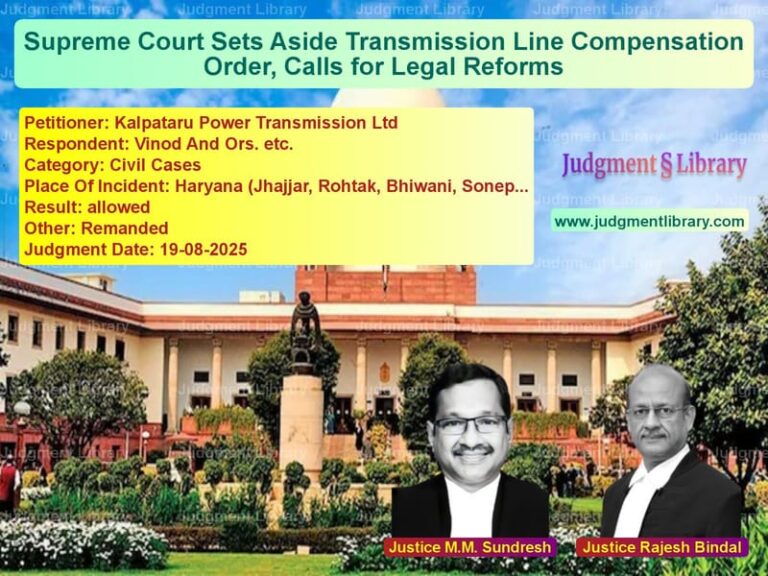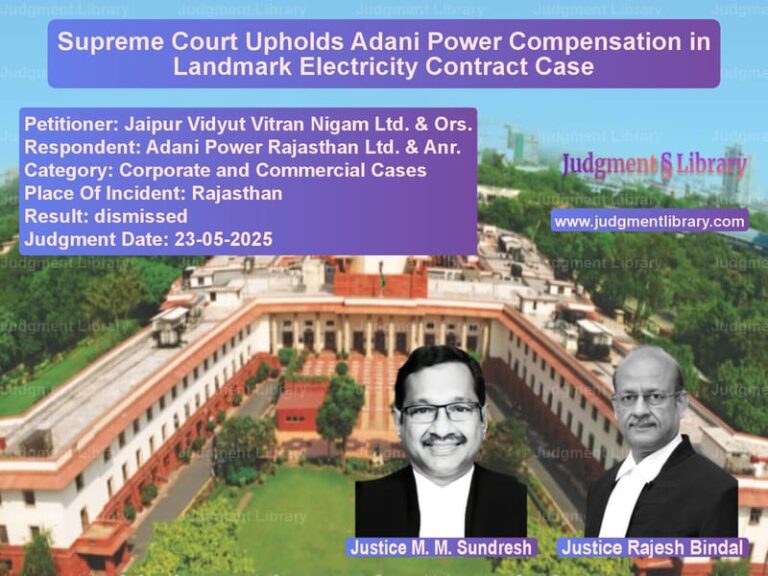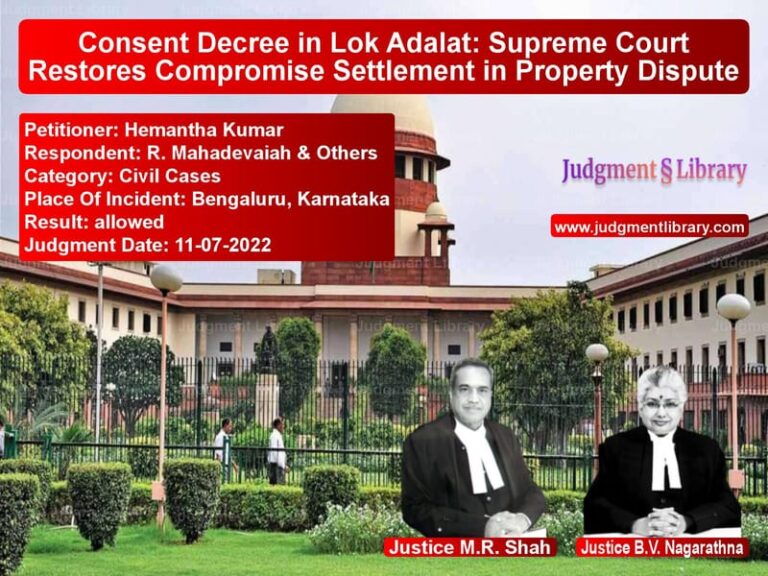Service Termination Without Hearing: Supreme Court Orders Due Process for Teacher in Uttar Pradesh
The case of Lakshmi Narain Dubey vs. State of Uttar Pradesh & Others revolves around the denial of approval for the appellant’s appointment as a teacher in a government-aided educational institution. The Supreme Court had to determine whether the competent authority’s refusal to approve his appointment without a proper hearing was legally justified.
The ruling emphasized the importance of adhering to procedural fairness and natural justice in employment disputes. The judgment reinforced the principle that an employee cannot be removed or denied benefits without being given a proper opportunity to present their case.
Background of the Case
The appellant, Lakshmi Narain Dubey, was appointed as a teacher in a government-aided institution in Uttar Pradesh. However, his appointment was not approved by the Competent Authority, which resulted in the denial of salary and other benefits. Aggrieved by this, he approached the High Court, challenging the decision.
The Single Judge of the High Court dismissed his writ petition on July 17, 2012, refusing to interfere with the authority’s decision. The appellant then filed an appeal before the Division Bench, which also declined to grant relief on August 16, 2017. Subsequently, the appellant approached the Supreme Court.
Key Legal Issues
- Whether the Competent Authority could deny approval of the appellant’s appointment without issuing a show cause notice.
- Whether the appellant’s service could be terminated without following the principles of natural justice.
- Whether the decision of the Division Bench, which upheld the denial of approval, was legally sustainable.
- Whether the appellant was entitled to a hearing before a final decision on his employment status.
Arguments by the Appellant (Lakshmi Narain Dubey)
- The appellant argued that he was appointed through a lawful process and had been serving as a teacher.
- He contended that denying him salary and benefits without a proper hearing was arbitrary and violated his fundamental rights.
- He asserted that any decision affecting his employment should have been taken only after providing him with an opportunity to respond.
- The appellant maintained that his employment was valid and should not have been unilaterally questioned by the Competent Authority.
Arguments by the Respondent (State of Uttar Pradesh & Others)
- The state contended that the appellant’s appointment was not properly approved by the relevant authorities.
- It argued that the Competent Authority had the right to review and decline approval based on procedural deficiencies.
- The respondents maintained that the decision to deny approval was justified and did not require additional hearings.
- They asserted that the appellant’s appointment did not meet all the necessary legal requirements.
Supreme Court’s Observations
The Supreme Court examined the procedural fairness in the case and made the following key observations:
- The appellant had been serving as a teacher, and his employment could not be arbitrarily denied without due process.
- The Competent Authority had an obligation to issue a show cause notice before making a final decision on the appellant’s employment status.
- The Division Bench erred in upholding the decision without considering the procedural lapses in denying the appellant a fair hearing.
- The principle of natural justice required that the appellant be given an opportunity to respond to any objections regarding his appointment.
Final Judgment
The Supreme Court ruled in favor of the appellant and set aside the order of the Division Bench. The key directives were:
- The Competent Authority was directed to issue a show cause notice to the appellant within one month.
- The appellant was granted the right to present his case before a final decision was made.
- Any other interested or affected parties, including Mr. Ram Raseele Pandey, who sought to intervene in the matter, were to be given a hearing.
- The Competent Authority was directed to take a final decision within three months after hearing all parties.
Legal Significance of the Judgment
This ruling reinforces the principle that an individual cannot be denied employment rights without due process. The judgment establishes that:
- Employees must be given a fair opportunity to present their case before any decision affecting their employment is made.
- The issuance of a show cause notice is a fundamental requirement in employment disputes.
- Courts must intervene to ensure procedural fairness when employment rights are at stake.
- Administrative decisions affecting employees must be transparent and follow principles of natural justice.
Impact on Future Cases
The Supreme Court’s decision sets an important precedent for cases involving employment disputes in government-aided institutions. It ensures that no employee can be denied salary or job security without due process. This ruling strengthens legal protections for employees facing arbitrary employment decisions.
Petitioner Name: Lakshmi Narain Dubey.Respondent Name: State of Uttar Pradesh & Others.Judgment By: Justice Kurian Joseph, Justice Navin Sinha.Place Of Incident: Uttar Pradesh.Judgment Date: 02-04-2018.
Don’t miss out on the full details! Download the complete judgment in PDF format below and gain valuable insights instantly!
Download Judgment: Lakshmi Narain Dubey vs State of Uttar Prade Supreme Court of India Judgment Dated 02-04-2018.pdf
Direct Downlaod Judgment: Direct downlaod this Judgment
See all petitions in Public Sector Employees
See all petitions in Employment Disputes
See all petitions in Judgment by Kurian Joseph
See all petitions in Judgment by Navin Sinha
See all petitions in allowed
See all petitions in Remanded
See all petitions in supreme court of India judgments April 2018
See all petitions in 2018 judgments
See all posts in Service Matters Category
See all allowed petitions in Service Matters Category
See all Dismissed petitions in Service Matters Category
See all partially allowed petitions in Service Matters Category







